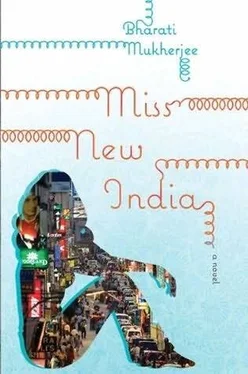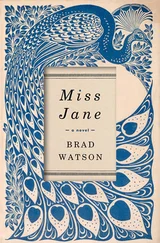Anjali waited by the curb until twelve o'clock. No one had entered or departed the property. Two goats wandered through the untended gate and soon lost themselves in the undergrowth. Finally, she followed the goats, dragging her bag behind her. The carved iron door knocker, surely an original relic, had lost its matching plate. A single horn of the brass ram's head thumped into the door's soft, bare wood like a woodsman's ax into a rotting stump.
A stooped old man with stubbly cheeks and chin opened the door. He wore a frayed service jacket like a railroad porter's, but with the name BAGEHOT stitched over an unmended pocket. The elbows were torn and the jacket was not clean.
"I would like to give this to Madam Bagehot," she said in Hindi. The old man, whose first name she later learned was Asoke, silently accepted the torn-off sheet on which Peter Champion had handwritten Minnie Bagehot's name and address and then signed it. He shuffled back inside, leaving the front door slightly open. She took this as permission to enter but then wondered if she should stand and wait on the threshold or take a seat on the long teak bench in the foyer. She stood stiffly by a round hall table with a cracked marble top, keeping her backpack and mud-streaked suitcase close to her for some minutes; then she tiptoed to the bench so she could peek into the hallways and rooms that led off the foyer. The corridors were cluttered with bulky armoires, chests and tall-backed chairs and seemed to stretch endlessly in every direction. She made out a main sitting room and a formal dining room with chandelier. The light was dim and filtered through sun-bleached velvet curtains. A broad stairwell descended from upper floors.
From what she could determine from the foyer, Bagehot House was a storage barn, more a warehouse for unusable possessions than an active residence. In the sitting room a hundred years of carved wood furniture and worn upholstery lay piled in a jumble. The walls were filled with portraits of women in ball gowns and bearded men in belted and braided military uniforms, shoulder pads with tassels and pointed helmets topped with what appeared at a distance to be upside-down banana peels. All available horizontal surfaces had been taken over by silver trays piled with dishes and ivory-handled cutlery. Everything seemed secondhand, even the air. Yet she sensed that every object had once held immense value. For some reason she was suddenly reminded of Peter Champion's words: every note a symphony.
She was hesitant to wander too far indoors. There were probably house rules against curiosity, and she didn't want to ruin her chances even before getting started. After twenty minutes, however, she wondered if she was not being tested, if Minnie Bagehot was not watching from behind a crack in the door just to see how many liberties she would take if she thought herself unobserved.
At twelve-thirty she heard voices from the second floor. She stood at the bottom of the stairs and smiled broadly. Three girls her own age, two of them dressed more or less as she was, in T-shirts and jeans, the other in a green salwar-kameez, were chattering in English as they came down the stairs. Anjali heard a breathless "I told him no way!" and a passionate rejoinder, "They should fire him on the spot!" They were nearly upon her before she was noticed.
"Well, hi," said the first girl down, the no way girl. She had spiked, highlighted hair and was much shorter than Anjali. "I'm Tookie D'Mello-Teresa, formally speaking. So you're the new boarder?" She held out her hand. Her scoop-neck T-shirt revealed deep cleavage and featured the three monkeys named see-no, hear-no, and speak-no, which were circled in red, with red lines struck through them. Where are the stores that sell cheeky T-shirts like the ones Anjali had seen today, cut so deep? Even if she borrowed one, Anjali doubted that she could produce even a shadow of a cleft.
"I was promised a room, sort of promised-I hope I have a place." Her story-the Gauripur teacher knowing Bagehot House's proprietor and orally guaranteeing that she would be accepted as a boarder-seemed too convoluted an explanation.
"Don't worry, there's always a place," said the second, she of the pale green salwar-kameez. She introduced herself as Husseina Shiraz, from Hyderabad. Her voice was warm and low, a good phone voice and, from what Anjali could tell, a perfect American accent. A Muslim girl from fabled Hyderabad, but no black sack and eye slits for her. She was as tall as Anjali and as fair, with the same green eyes. Anjali repressed her first impulse, which was to say Did you say Hyderabad? I changed buses there yesterday! And then she censored a second thought: We could almost pass for sisters, more than my own sister and I could. Husseina also seemed to notice that likeness, staring almost to the point of remarking on it, then turned her head. Sisters, Anjali thought again, only if I dressed up in expensive silks.
"Or space will open up," said the third, much shorter and darker, with glasses, dressed in what looked like an old school uniform of gray tunic and white shirt. "Sunita Sampath," she said. She described herself as "a local girl" and named a small town halfway between Mysore and Bangalore. Whom did she know, to make it into Bagehot House? Anjali wondered.
"Sunita even speaks this wretched language," Tookie joked.
"I can give you lessons," Sunita offered.
When Anjali gave them her full name, with its unmistakable Bangla identifier, Tookie rattled off the names of half a dozen Bengali women she worked with. Refugees from marital wars, Anjali wondered, or well-heeled adventurers from progressive families, pursuing the perfect match? Tookie was obviously Goan, neutralizing Anjali's sour memory of Fathers Lobo and Pinto, dull teacher-priests back at da Gama. Tookie sounded friendly but flaky as she ran down her list of ethnic stereotypes: Goans are party beasts, Tamils dorky number-crunchers, Pathans burly hotheads, Bengalis flabby eggheads. Then she added, "Maybe not all the Bengali guys I know. There's one exception. One genuine Romeo." Anjali was about to interject Not the famous Monish Lahiri? But she was smart. She caught herself in time.
Instead she asked, "Where are you girls off to?"
"Smokes and caffeine," said Husseina. "Then it's hi-ho, hi-ho. Back by midnight."
"After more smokes and booze," said Tookie.
"Actually I don't drink," said Husseina. "My fiancé would not approve."
"Nor do I," added Sunita. "Or smoke."
And I never have, thought Anjali. But I had a fiancé. For an hour, at least. It was a frightening word.
Bangalore worked off the American clock. Everything about Bangalore-even its time-was virtual. Call centers ran 24/7; shifts were constantly starting or ending nine to twelve hours ahead of American time. Peter had said some of the girls even kept Los Angeles or New York time on their watches, calibrated to a mythical home base so they wouldn't be trapped in complicated calculations if asked the time. No "Good morning!" when someone was calling at midnight in America. Some white callers liked to play games, she'd heard, "exposing the Indian." And of course there were the lonely Indians in America, like Mukesh Sharma, trying to tease out phone intimacy from call-center girls.
Then she became aware that all three girls seemed to be looking over their shoulder at the front door. Husseina broke away from the group. "Oh-oh, got to go," she whispered. "Ciao, ladies." She pulled open the heavy front door before Asoke could shuffle to it. The other two tittered. Angie spotted a taxi waiting at the curb. She was about to ask Tookie where Husseina was off to when suddenly a black-sheathed wisp of a woman, with close-cropped white hair, moved like fog into the hallway.
Читать дальше












